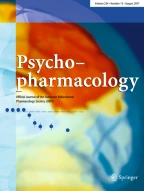4826Accesses
1070Citations
13 Altmetric
Abstract.
Rationale: Among the various experimental protocols that have been used to measure drug reward in laboratory animals, conditioned place preference (CPP) has been one of the most popular. However, a number of controversial issues have surrounded the use of this experimental protocol. Objective: The present review provides a theoretical overview of some critical issues relevant to CPP. The advantages and limitations of CPP are also covered. Results: Based on modern and traditional theoretical formulations of Pavlovian conditioning, CPP appears to reflect a preference for a context due to the contiguous association between the context and a drug stimulus. Within this theoretical framework, it seems clear that CPP measures a learning process that is fundamentally distinct from drug self-administration. The main advantages of CPP are that it: (1) tests animals in a drug-free state; (2) is sensitive to both reward and aversion; (3) allows for simultaneous determination of CPP and locomotor activity; (4) is adaptable to a variety of species; (5) typically yields dose-effect curves that are monophasic rather than biphasic; and (6) has utility in probing the neural circuits involved in drug reward. The main limitations of CPP are that it: (1) is subject to interpretation based on the notion of novelty seeking; (2) is cumbersome for providing the graded dose-effect curves needed for answering some pharmacological questions; (3) is difficult to interpret when animals prefer one context prior to drug conditioning; and (4) lacks face validity as an experimental protocol of drug reward in humans. Conclusion: Despite some limitations, CPP provides unique information about the rewarding effect of contextual cues associated with a drug stimulus.
This is a preview of subscription content,log in via an institution to check access.
Access this article
Subscribe and save
- Get 10 units per month
- Download Article/Chapter or eBook
- 1 Unit = 1 Article or 1 Chapter
- Cancel anytime
Buy Now
Price includes VAT (Japan)
Instant access to the full article PDF.
Similar content being viewed by others
Explore related subjects
Discover the latest articles and news from researchers in related subjects, suggested using machine learning.Author information
Authors and Affiliations
Department of Psychology, University of Kentucky, Lexington, KY 40506, USA, , , , ,
M.T. Bardo
Department of Psychology, University of Nebraska, Lincoln, NE 68588, USA, , , , ,
R.A. Bevins
- M.T. Bardo
Search author on:PubMed Google Scholar
- R.A. Bevins
Search author on:PubMed Google Scholar
Additional information
Electronic Publication
Rights and permissions
About this article
Cite this article
Bardo, M., Bevins, R. Conditioned place preference: what does it add to our preclinical understanding of drug reward?.Psychopharmacology153, 31–43 (2000). https://doi.org/10.1007/s002130000569
Received:
Accepted:
Issue Date:
Share this article
Anyone you share the following link with will be able to read this content:
Sorry, a shareable link is not currently available for this article.
Provided by the Springer Nature SharedIt content-sharing initiative

